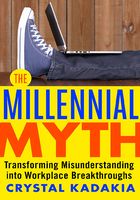
Where Did the Perceptions Come From?
Many books, written in the past decade mostly by baby boomers and gen Xers, looked into the crystal ball and made predictions about millennial characteristics as they were growing up. Before the explosive rise of the smartphone and social media, in their seminal book published in 2000, Millennials Rising: The Next Great Generation, Neil Howe and William Strauss cautioned, “Nearly all of today’s teen negatives are residues of trends launched by the boomers, apexed by gen Xers. Conversely, nearly all of today’s teens’ positives are new trends, unique to millennials, with much of the initiative coming from them.” Today, we continually witness the impact of negative perceptions as leaders struggle to choose between inaction and action, afraid of “pandering” to millennial expectations, rather than viewing these new perspectives as an opportunity to modernize for the common good.
Today, we continually witness the impact of negative perceptions as leaders struggle to choose between inaction and action, afraid of “pandering” to millennial expectations, rather than viewing these new perspectives as an opportunity to modernize for the common good.
Initially, the theories about millennials were presented by qualified researchers who had invested hours collecting data and distilling stories into meaningful representations. Howe and Strauss were among the first generational analysts to gain popularity. They put forth an immensely positive view of the millennial generation. Later, other generational analysts such as Jean Twenge (author of Generation Me) and Mark Bauerlein (author of The Dumbest Generation) criticized their approach and instead popularized the negative aspects of millennials. The words “narcissistic,” “entitled,” and “lazy” began to emerge. However, these phrases weren’t just passed into society through books and articles. They were passed through social media, an exponentially viral medium, in which unreliable data and sensational messages spread like wildfire.
Millennials responded with fierce blogs, “rants,” videos, and memes. Two different worlds collided: the world of the distinguished expert and the world of the digital influencer. As social media’s two-way information flow grew at an enormous rate post-2000, the distinctly negative perception won out, because frankly, that is what made headlines. More than 20 articles per day are published online on the topic of millennials, everything from how they choose to vote to home-buying habits to the latest top 10 list on what is liked or disliked about them. Living in this information-bloated world, it’s no wonder society at large began to parrot the drama we heard. In contrast, while every generation has dealt with complaints, gen X and boomers didn’t have such a variety of highvolume, fast-paced sources of vocal discontent to contend with when they were coming of age.
Regardless, neither of these approaches, positive or negative, is fully accurate. And often, whether the writers are experts or bloggers, they simply select the formative events that best serve the idea they want to present: either that millennials will be saviors of mankind or that millennials are no more than device-controlled vegetables who expect everything to be done for them. Through the virality of social media, these crystal ball predictions have become the accepted truth, instead of being validated and confirmed. Older generations invented a tool they didn’t know the full capability of: the Internet. They failed to realize the avalanche of biased blind spots and generation gaps that would be caused by their quick judgment. The root cause behind the challenges of attracting and retaining millennials in the workplace lies within this widespread avalanche of misunderstanding. What we have today is just a slice of the overall picture, presented by white papers, top 10 lists, blogs, videos, books, TV interviews, and misguided speakers and trainers.
The degree of the disservice we have done to the millennial generation through the unintended impact of social media is evident. Pew Research conducted a study in 2015 on how generations perceive themselves. It’s telling that only 8 percent of millennials feel the generational label describes their generation very well. Furthermore, when the study goes on to explore the traits attributed to each generation, millennials are the harshest critics of their own generation, unlike any of the other generations. Surprisingly, this indicates that millennials themselves have internalized the media’s negative definition of them, but 92 percent of millennials don’t identify with the labels! There is a significant disconnect between the characteristics assumed of the millennial generation and the reality experienced by actual millennials. Evidently, the generational labels we have for millennials today are ... mislabeled.
It’s telling that only 8 percent of millennials feel the generational label describes their generation very well. Furthermore, when the study goes on to explore the traits attributed to each generation, millennials are the harshest critics of their own generation, unlike any of the other generations. Surprisingly, this indicates that millennials themselves have internalized the media’s negative definition of them, but 92 percent of millennials don’t identify with the labels! There is a significant disconnect between the characteristics assumed of the millennial generation and the reality experienced by actual millennials. Evidently, the generational labels we have for millennials today are ... mislabeled.
Like much propaganda, it’s those at the top who have the most power to shape our views—and the people at the top today are boomers, equal in size to the millennial population. Ironically, generation X voiced many of the same workplace desires as millennials, but as a smaller generation, they were relegated to fighting like David against Goliath. Today, it’s more equally matched and like a game of Chicken, the question is who will dodge first? Will the deeply ingrained command and control preference of traditional mindsets win out, or will the collaborative tendencies of millennials influence us to work together to shape the future of work instead?